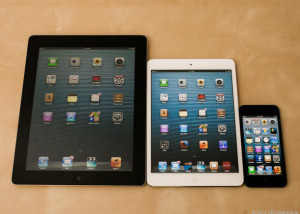My idle thoughts on tech startups
Small Tablets Are Further Atomizing Ubiquitous Computing
 I’ve been enjoying my iPad Mini for a couple months month now. I thought seriously about getting a Nexus 7 (in fact gave one to my sister as a gift recently), but because I’m frequently on the go with intermittent WiFi I got the Mini which is still one of the few LTE-enabled 7 inch tablets currently on the market.
I’ve been enjoying my iPad Mini for a couple months month now. I thought seriously about getting a Nexus 7 (in fact gave one to my sister as a gift recently), but because I’m frequently on the go with intermittent WiFi I got the Mini which is still one of the few LTE-enabled 7 inch tablets currently on the market.
As my partners & I have written about constantly, we think “mobile” is a terribly misleading term for what is a broad megatrend of ubiquitous computing. More people are computing more of the time with a broader array of personal devices, not simply a substitution of “mobile” computing for “desktop” computing. And now having lived with my iPad Mini for awhile it’s clear to me that 7 inch or other small tablets are further atomizing the overall world of ubiquitous computing.
Just as usage patterns between smartphones and the original generation of 11″ tablets (led by the iPad of course) are pretty different, and usage between Android and iOS devices varies significantly, I see 7″ tablets being used in different ways and potentially by different people than 11″ tablets or smartphones. So what are the distinctions?
- Not A Laptop Replacement – I’m skeptical that tablets will completely replace a primary “computer” (laptop or desktop at home, workplace, and/or school) for many consumers in the foreseeable future. But for a meaningful swath of consumers, a large 11″ tablet can be a substitute for a decent chunk of the activities they used to do with a laptop or other primary computer. In the business world you see some folks that used to bring a laptop to meetings now come with tablets. In my own family, my wife now basically does all her computing at home using an 11″ tablet rather than her personal laptop. But a 7″ tablet is marginally harder to use than a large tablet, so you’ll see them used less frequently in these laptop replacement scenarios.
- Better On The Go Device – For many of the same reasons a large tablet is better as a laptop replacement, a small tablet is better as an on the go device. It’ll fit in a purse or a jacket pocket whereas an 11″ tablet won’t, making small tablets the kind of thing you use to consume content, do basic communication (e.g. quick emails), etc. For example, I find my iPad Mini to be a far superior e-reader than a full-sized tablet since the size and weight make it easy to hold with one hand. Smartphones are nearly ubiquitous (passed 50% US penetration at end of 2012), but many consumers don’t want to use them for more than brief sessions lasting <5 min. A small tablet on the other hand is convenient and useful for a much longer (e.g. 10-30 min) sessions, so even though you won’t carry it everywhere like a phone people will use small tablets a lot on the go (e.g. the coffee shop, mass transit, quick meeting or waiting period scenarios). Several people have told me in recent weeks they carry their iPad Mini or Nexus 7 or Galaxy Note similar small tablet wherever they go.
- Low Cost = Broader Entry Point – We’re >5 years into the smartphone adoption cycle (more than that if you want to count Blackberries and Treos) and barely 2 years into the tablet adoption cycle. Prices for all tablets will continue to come down over time, but certainly for the next several years 7″ tablets will be several hundred dollars cheaper than large tablets and will therefore be a tablet “entry point” for a broader swath of consumers. A significant majority of consumers in the US do not have a tablet today, and I believe that by the time we reach >50% penetration of tablets overall, ~7″ tablets could be as much as half the market despite being manufactured and sold for less time than large tablets.
So small tablets are expanding the trend of ubiquitous computing and also will drive higher tablet penetration. They’re simultaneously atomizing the “mobile” ecosystem. Developers already have to think about smartphones and tablets distinctly just as they think about platforms (iOS, Android, etc) distinctly. A bad ecosystem outcome is if small tablets create yet another class of experience that software developers have to consider. It’s something I’ve been pondering as I think about the broader shifts that are going to happen at an OS and core app level (mobile browser, etc) in the next 0-5 years.
